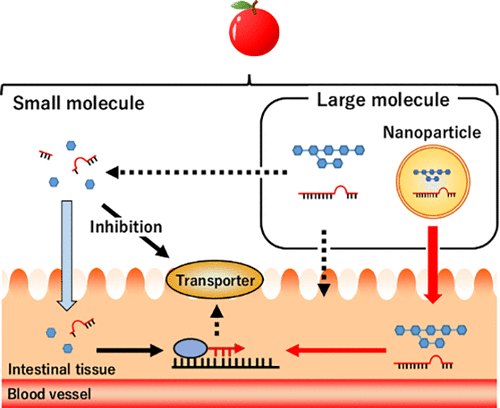当前位置:
X-MOL 学术
›
Mol. Pharmaceutics
›
论文详情
Our official English website, www.x-mol.net, welcomes your
feedback! (Note: you will need to create a separate account there.)
Apple-Derived Nanoparticles Modulate Expression of Organic-Anion-Transporting Polypeptide (OATP) 2B1 in Caco-2 Cells
Molecular Pharmaceutics ( IF 4.5 ) Pub Date : 2018-10-25 00:00:00 , DOI: 10.1021/acs.molpharmaceut.8b00921 Daichi Fujita 1 , Toshiki Arai 1 , Hisakazu Komori 1 , Yuma Shirasaki 1 , Tomohiko Wakayama 2 , Takeo Nakanishi 1 , Ikumi Tamai 1
Molecular Pharmaceutics ( IF 4.5 ) Pub Date : 2018-10-25 00:00:00 , DOI: 10.1021/acs.molpharmaceut.8b00921 Daichi Fujita 1 , Toshiki Arai 1 , Hisakazu Komori 1 , Yuma Shirasaki 1 , Tomohiko Wakayama 2 , Takeo Nakanishi 1 , Ikumi Tamai 1
Affiliation

|
Interaction of foods with intestinal transporters has generally been ascribed to small molecules, but recently, edible-plant-derived nanoparticles (NPs) have been suggested to affect intestinal function. Here, we examined the effects of NPs contained in edible fruits on intestinal transporters. Apple-derived NPs (APNPs) were isolated by ultracentrifugation and characterized by measurement of particle size distribution and electron microscopy. Human epithelial colorectal adenocarcinoma (Caco-2) cells internalized fluorescently labeled APNPs, suggesting that fruit-derived NPs would be internalized into intestinal epithelial cells in vivo. We found that the mRNA expression levels of several transporters, including organic-anion-transporting polypeptide (OATP) 2B1, were changed in APNP-treated Caco-2 cells. The protein expression and activity of OATP2B1 were also decreased by APNP exposure, as determined by Western blotting and measurements of [3H]estrone-3-sulfate uptake by Caco-2 cells, respectively. These actions required intact APNPs, because sonication or boiling abrogated the effects. Since the content of apple-derived small molecules in APNPs was negligible, the observed decrease of OATP2B1 expression appears to be mediated by large molecules in the APNPs. We further found that the 3′-untranslated region of the OATP2B1 gene was required for the response to APNPs, suggesting that microRNA in the APNPs might be involved. These results propose a novel mechanism, in which large molecules such as microRNA in food could affect intestinal transporters through food-derived NPs, which also demonstrates that food-derived NPs should be useful for delivery of biologically active large molecules to intestinal tissues.
中文翻译:

苹果派生的纳米颗粒调节有机阴离子转运多肽(OATP)2B1在Caco-2细胞中的表达。
食物与肠道转运蛋白的相互作用通常归因于小分子,但是最近,有人提出食用植物来源的纳米颗粒(NPs)影响肠道功能。在这里,我们检查了可食用水果中所含NP对肠转运蛋白的影响。通过超速离心分离苹果衍生的NP(APNP),并通过测量粒度分布和电子显微镜进行表征。人上皮结肠直肠腺癌(Caco-2)细胞内化了荧光标记的APNP,这表明源自水果的NPs将在体内被内化到肠上皮细胞中。我们发现在APNP处理的Caco-2细胞中,包括有机阴离子转运多肽(OATP)2B1在内的几种转运蛋白的mRNA表达水平均发生了变化。Caco-2细胞分别吸收3 H]雌酮-3-硫酸盐。这些操作需要完整的APNP,因为超声处理或煮沸消除了这种影响。由于苹果派生的小分子在APNPs中的含量可以忽略不计,因此观察到的OATP2B1表达下降似乎是由APNPs中的大分子介导的。我们进一步发现OATP2B1基因的3'-非翻译区是对APNPs应答所必需的,这表明APNPs中的microRNA可能参与了。这些结果提出了一种新的机制,其中食物中的大分子(如microRNA)可通过食物衍生的NP影响肠道转运蛋白,这也表明食物衍生的NP应可用于将具有生物活性的大分子递送至肠道组织。
更新日期:2018-10-25
中文翻译:

苹果派生的纳米颗粒调节有机阴离子转运多肽(OATP)2B1在Caco-2细胞中的表达。
食物与肠道转运蛋白的相互作用通常归因于小分子,但是最近,有人提出食用植物来源的纳米颗粒(NPs)影响肠道功能。在这里,我们检查了可食用水果中所含NP对肠转运蛋白的影响。通过超速离心分离苹果衍生的NP(APNP),并通过测量粒度分布和电子显微镜进行表征。人上皮结肠直肠腺癌(Caco-2)细胞内化了荧光标记的APNP,这表明源自水果的NPs将在体内被内化到肠上皮细胞中。我们发现在APNP处理的Caco-2细胞中,包括有机阴离子转运多肽(OATP)2B1在内的几种转运蛋白的mRNA表达水平均发生了变化。Caco-2细胞分别吸收3 H]雌酮-3-硫酸盐。这些操作需要完整的APNP,因为超声处理或煮沸消除了这种影响。由于苹果派生的小分子在APNPs中的含量可以忽略不计,因此观察到的OATP2B1表达下降似乎是由APNPs中的大分子介导的。我们进一步发现OATP2B1基因的3'-非翻译区是对APNPs应答所必需的,这表明APNPs中的microRNA可能参与了。这些结果提出了一种新的机制,其中食物中的大分子(如microRNA)可通过食物衍生的NP影响肠道转运蛋白,这也表明食物衍生的NP应可用于将具有生物活性的大分子递送至肠道组织。

































 京公网安备 11010802027423号
京公网安备 11010802027423号